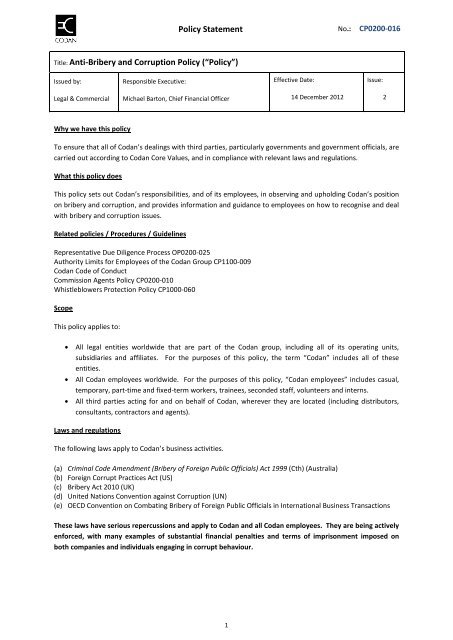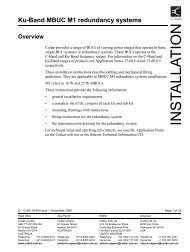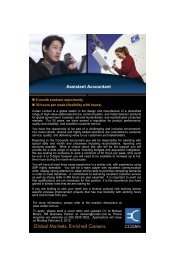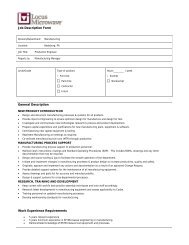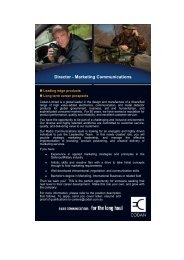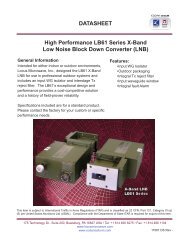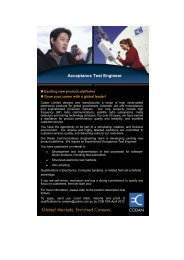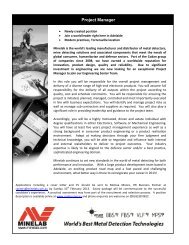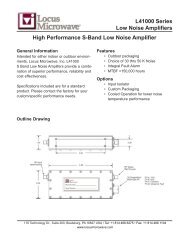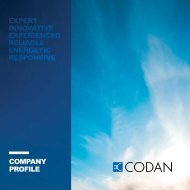Policy Statement Title: Anti-Bribery and Corruption Policy (âPolicyâ)
Policy Statement Title: Anti-Bribery and Corruption Policy (âPolicyâ)
Policy Statement Title: Anti-Bribery and Corruption Policy (âPolicyâ)
Create successful ePaper yourself
Turn your PDF publications into a flip-book with our unique Google optimized e-Paper software.
<strong>Policy</strong> <strong>Statement</strong> No.: CP0200-016<strong>Title</strong>: <strong>Anti</strong>-<strong>Bribery</strong> <strong>and</strong> <strong>Corruption</strong> <strong>Policy</strong> (“<strong>Policy</strong>”)Issued by:Responsible Executive:Effective Date:Issue:Legal & CommercialMichael Barton, Chief Financial Officer14 December 20122Why we have this policyTo ensure that all of Codan’s dealings with third parties, particularly governments <strong>and</strong> government officials, arecarried out according to Codan Core Values, <strong>and</strong> in compliance with relevant laws <strong>and</strong> regulations.What this policy doesThis policy sets out Codan’s responsibilities, <strong>and</strong> of its employees, in observing <strong>and</strong> upholding Codan’s positionon bribery <strong>and</strong> corruption, <strong>and</strong> provides information <strong>and</strong> guidance to employees on how to recognise <strong>and</strong> dealwith bribery <strong>and</strong> corruption issues.Related policies / Procedures / GuidelinesRepresentative Due Diligence Process OP0200-025Authority Limits for Employees of the Codan Group CP1100-009Codan Code of ConductCommission Agents <strong>Policy</strong> CP0200-010Whistleblowers Protection <strong>Policy</strong> CP1000-060ScopeThis policy applies to:· All legal entities worldwide that are part of the Codan group, including all of its operating units,subsidiaries <strong>and</strong> affiliates. For the purposes of this policy, the term “Codan” includes all of theseentities.· All Codan employees worldwide. For the purposes of this policy, “Codan employees” includes casual,temporary, part-time <strong>and</strong> fixed-term workers, trainees, seconded staff, volunteers <strong>and</strong> interns.· All third parties acting for <strong>and</strong> on behalf of Codan, wherever they are located (including distributors,consultants, contractors <strong>and</strong> agents).Laws <strong>and</strong> regulationsThe following laws apply to Codan’s business activities.(a) Criminal Code Amendment (<strong>Bribery</strong> of Foreign Public Officials) Act 1999 (Cth) (Australia)(b) Foreign Corrupt Practices Act (US)(c) <strong>Bribery</strong> Act 2010 (UK)(d) United Nations Convention against <strong>Corruption</strong> (UN)(e) OECD Convention on Combating <strong>Bribery</strong> of Foreign Public Officials in International Business TransactionsThese laws have serious repercussions <strong>and</strong> apply to Codan <strong>and</strong> all Codan employees. They are being activelyenforced, with many examples of substantial financial penalties <strong>and</strong> terms of imprisonment imposed onboth companies <strong>and</strong> individuals engaging in corrupt behaviour.1
<strong>Policy</strong> <strong>Statement</strong> No.: CP0200-016<strong>Title</strong>: <strong>Anti</strong>-<strong>Bribery</strong> <strong>and</strong> <strong>Corruption</strong> <strong>Policy</strong> (“<strong>Policy</strong>”) Issue: 2POLICYCorrupt payments - Codan employees must not make, offer to make, promise to make or authorise anyimproper “payments” or provide “anything of value” to public officials, political c<strong>and</strong>idates, parties or partyofficials, private individuals or private sector employees to influence or reward any action by that party.Indirect payments - These prohibitions also apply to any payments or provision of anything of value by a thirdparty for or on behalf of Codan. Codan employees will not make, offer to make, or authorise payment to athird party (e.g., sales agent, distributor or intermediary) with “knowledge” that all or part of the payment willbe offered or given to any individual to secure an improper advantage, or obtain or retain business.Public <strong>and</strong> private sectors - These prohibitions apply to existing or potential business arrangements todealings both in the public or private sectors.Government officials - These prohibitions apply to any payments made to or at the request of governmentofficials, which are of particular concern due to the existence of specific anti-corruption laws in the countries inwhich we operate.Third parties - <strong>Anti</strong>-corruption laws do not always differentiate between conduct of Codan <strong>and</strong> conduct of athird party acting for <strong>and</strong> on behalf of Codan. Therefore, it is Codan’s obligation to know its business partners<strong>and</strong> to ensure that any third parties with <strong>and</strong> through whom Codan conducts business acknowledge <strong>and</strong> agreeto comply with the principles of this policy.High risk third parties - Codan employees must be aware that dealings with certain categories of third partiescarry a higher risk of corruption <strong>and</strong> may subject Codan to legal liability, so they will require a higher level ofoversight under this policy. In particular, Codan employees must be vigilant when entering into deals withthird parties that fall within any of the following categories:· all commission agents.· third parties that are organised in <strong>and</strong>/or operating in high risk markets <strong>and</strong> are acting on Codan’sbehalf.· third parties acting on Codan’s behalf who interact with government officials.· third parties (including but not limited to new or potential acquisitions) over whom Codan exercises orwill exercise a degree of ownership or control.Due Diligence of high risk third parties - Codan employees are required to conduct due diligence on high riskthird parties <strong>and</strong> comply with any other requirements of the Third Party Due Diligence Report.Facilitating payments - For the avoidance of doubt, facilitating payments (otherwise known as “greasingpayments” <strong>and</strong> defined as small payments made to secure or expedite the proper performance of a routinenon-discretionary government action by government officials, e.g. issuing licences or permits, processing goodsthrough customs) are no exception <strong>and</strong> are <strong>and</strong> therefore prohibited.Personal safety - This policy does not apply to circumstances in which an employee has a genuine concernabout their personal safety <strong>and</strong> as a consequence meets a dem<strong>and</strong> for a facilitating payment, whether inconnection with their employment or not. However, all Codan employees are required to report such incidentsarising in the course of their employment to Codan’s Internal Legal Counsel as soon as practicable.Gifts <strong>and</strong> hospitality - Prior to giving or receiving, or offering or promising to give or receive, gifts orhospitality, all Codan employees must follow Codan’s gift, hospitality <strong>and</strong> entertainment rules.2
<strong>Policy</strong> <strong>Statement</strong> No.: CP0200-016<strong>Title</strong>: <strong>Anti</strong>-<strong>Bribery</strong> <strong>and</strong> <strong>Corruption</strong> <strong>Policy</strong> (“<strong>Policy</strong>”) Issue: 2Permissible activities - This policy does not prevent Codan employees from conducting legitimate businesswith private parties <strong>and</strong> the government, as long as it complies with Codan’s policies <strong>and</strong> procedures. Codanin many instances interacts with government officials in the context of the promotion of Codan’s products, inthe execution of a contract with a government entity, <strong>and</strong> in general, in the legitimate conduct of its business.Under limited circumstances, reasonable <strong>and</strong> bona fide expenditures, such as actual travel <strong>and</strong> lodgingexpenses directly related to such activities are permissible provided that they are permitted by Codan policies,are appropriate in the circumstances, are lawful under the written laws <strong>and</strong> regulations of the governmentofficial’s country <strong>and</strong> have the appropriate prior review <strong>and</strong> approval.Accuracy of books <strong>and</strong> records - Codan must keep financial records <strong>and</strong> have appropriate internal controls inplace which will evidence the business reason for making payments to third parties. No accounts must be kept"off-book" to facilitate or conceal improper payments.Responsibilities - All levels of Codan management are responsible for enforcing compliance with this policy<strong>and</strong> ensuring that Codan employees responsible to them are aware of this policy <strong>and</strong> the need for compliance.This includes regular monitoring of the Reportable Gifts <strong>and</strong> Reportable Entertainment received or offered byCodan employees reporting to them. Codan executive management also have specific obligations with regardto implementing the due diligence <strong>and</strong> oversight of third parties as provided for in the Third Party DueDiligence Framework.Raising a concern - If at any time you have any question about the application of this policy or you needguidance or assistance in a particular case or if you want to report a circumstance you believe may be a breachor may result in a breach of this policy, you should first escalate your concerns to your manager, then the LegalDepartment or via Codan’s Whistleblowers <strong>Policy</strong>. You can do this on a confidential basis.Disciplinary action - Any employee who breaches this policy will face disciplinary action, which could result indismissal for gross misconduct.Consequences of infringing the law - Depending on the circumstances, bribery <strong>and</strong> corruption are punishablefor individuals by imprisonment <strong>and</strong>, if Codan is found to have taken part in corruption, Codan could face anunlimited fine, be excluded from tendering for public contracts <strong>and</strong> face damage to its reputation. Codantherefore take its legal responsibilities very seriously.Training <strong>and</strong> communication - Training on this policy forms part of the induction process for certain newCodan employees. All Codan employees with significant exposure to bribery & corruption issues will receiveregular training on how to implement <strong>and</strong> adhere to this policy. Our zero-tolerance approach to bribery <strong>and</strong>corruption must also be communicated to all suppliers, contractors <strong>and</strong> business partners at the outset of ourbusiness relationship with them <strong>and</strong> as appropriate thereafter.3
<strong>Policy</strong> <strong>Statement</strong> No.: CP0200-016<strong>Title</strong>: <strong>Anti</strong>-<strong>Bribery</strong> <strong>and</strong> <strong>Corruption</strong> <strong>Policy</strong> (“<strong>Policy</strong>”) Issue: 2GlossaryAnything of value: this term includes, but is not limited to, cash or cash equivalents, gifts, services,employment offers, loans, travel expenses, entertainment, political contributions, charitable donations,subsidies, per diem payments, sponsorships, or provision of any other asset, even if nominal in value.Government official means:· Any officer or employee of a government or any department, agency or instrumentality of agovernment;· Any person acting in an official capacity for or on behalf of a government or any department, agency, orinstrumentality of a government;· Any officer or employee of a company or business owned in whole or part by a government;· Any officer or employee of a public international organization such as the World Bank or United Nations;· Any officer or employee of a political party or any person acting in an official capacity on behalf of apolitical party; <strong>and</strong>/or· Any c<strong>and</strong>idate for political office.High risk markets: Refers to those markets that appear on the annual Transparency International <strong>Corruption</strong>Perception Index with scores of 50 <strong>and</strong> below. See link for latest CPI scores: http://www.transparency.org/.Knowledge: An employee is considered to have “knowledge” if the employee (i) is aware that a corruptpayment is being made, (ii) is aware that a corrupt payment is likely to occur, or (iii) or has reason to know thata corrupt payment is likely to occur. Refusal to know, deliberate ignorance, conscious disregard, <strong>and</strong> wilfulblindness are treated as “knowledge” for purposes of this policy.Payments: This term refers to <strong>and</strong> includes any direct or indirect offers to pay, promises to pay, authorizationsof or payments of anything of value.Third party: Any individual or organisation an employee comes into contact with during the course of theirwork for Codan, <strong>and</strong> includes actual <strong>and</strong> potential customers, suppliers, distributors, business contacts, agents,advisers, <strong>and</strong> government <strong>and</strong> public bodies, including their advisors, representatives <strong>and</strong> officials, politicians<strong>and</strong> political parties.4


